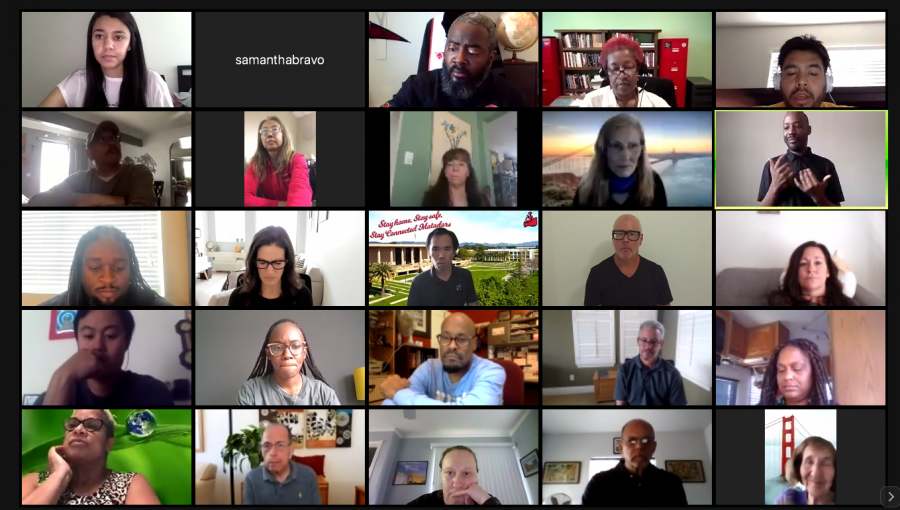CSUN students, faculty and administrators create a space for healing amid the George Floyd protests
Photo from the virtual program hosted by the University Student Union and University Counseling Services on May 29
June 2, 2020
CSUN students, faculty and administrators were given the opportunity to process their thoughts in the wake of the killing of George Floyd. Over 100 participants attended the virtual Zoom discussion Friday evening, where they shared personal experiences and frustrations.
Paulette Theresa-Schechtel and Abram Milton, a staff psychologist and a staff counselor from University Counseling Services, began the discussion by welcoming students and faculty. They stated that the discussion was a safe environment and a place for everyone to grieve.
“All contributions will matter, because people have different kinds of perspectives and we want to hear these, but be aware not everyone is in the same place emotionally and their life experiences,” Milton said. “We will practice mutual respect. We won’t try to cut people off, but the main thing is the emotion of process, about validating feelings and thinking about what social change can look like in the future.”
Marlon James Briggs, another counselor from University Counseling Services, said when someone sees violence and injustice, they can experience symptoms of post-traumatic stress, anxiety and depression.
“I think it’s important that we gather here today as a collective, because we’re all grieving a loss, in one way or another. Amongst the community there are things known as vicarious trauma and secondary trauma, and those two are sort of interchangeable terms,” Briggs said. “When we see things like this happen to Mr. Floyd or to any other Black person that is assaulted, violated or killed in this way, we can almost feel as though it’s happening to us.”
Briggs said they want to create a space to address the pain, concerns, fear, anger and frustration individuals are feeling.
“The best way to deal with these emotions is to be able to express them,” Briggs said.
Students, faculty and staff began participating in the discussion. While many kept their cameras on to have a face-to-face discussion during the event, participants will remain anonymous due to the personal nature of the discussion.
One participant said she was glad to see people of other ethnicities protesting and coming together to voice their disapproval of police brutality. She also expressed her fears as an African American parent.
“I am an African American mother, I am raising three African American boys. So I, too, can one day be mourning the loss of my children,” she said. “One day, my children could be mourning the loss of me.”
She also said she was dissatisfied with the normalization of police brutality and how the police aren’t held accountable for their violence.
“I will only be pleased when cops who are murdering African Americans, Latino people, any person … are not only charged, but that they are arrested, and that they are put in jail,” she said.
Another participant talked about the challenge of talking to her daughter about the issues that are affecting the Black community.
“I have a family friend who died in the hands of the police and I wanted to know what tools or suggestions do you have as far as how to be able to inform young children about these types of issues,” the participant said. “As a Black woman and having a Black daughter, it’s important to me to let her know these types of things happen, that she can be a victim of this type of violence, so being able to share this information without causing trauma to her, it’s scary as a parent to share these kinds of topics but it’s definitely needed.”
Milton said since children learn through observation, children should be allowed to see how parents acknowledge and work through their emotions via means such as advocacy when dealing with heavy issues such as police brutality.
“We’re going to end by continuing the theme that we move ahead, by moving ahead together, for any effective change we have to be a part of it, whether it’s comfortable or not, we have to make the change in order to make a better world,” Theresa-Schechtel said.
CSUN faculty concluded the discussion by playing Bill Withers’ song, “Lean On Me.”
